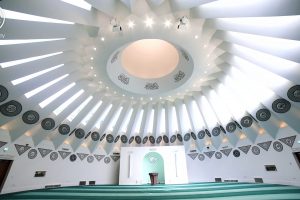
In the Mubarak Mosque in Islamabad, Tilford, His Holiness Hazrat Mirza Masroor Ahmad (aba) envisioned having the attributes of Allah on its walls so people could reflect deeper on God’s existence. His Holiness (aba) guided minutely on all aspects of design and implementation.
This series delves deeper into each of God’s attributes to gain a better understanding of His Being.
The calligraphy was designed by Razwan Baig, while The Review of Religions were given the opportunity to manage the project and produce each piece. Research for this series was compiled by Syed Mubashar Ayyaz (Research Cell) and translated into English by Shahzad Ahmed, Zafir Mahmood Malik and Nooruddeen Jahangeer Khan.
90. The Originator (Al-Badī‘)

بَدِيعُ السَّمَاوَاتِ وَالْأَرْضِ وَإِذَا قَضَى أَمْرًا فَإِنَّمَا يَقُولُ لَهُ كُنْ فَيَكُونُ
He is the Originator of the heavens and the earth. When He decrees a thing, He does only say to it, ‘Be!’ and it is. [1]
The attribute الْبَدِیْعُ (Al-Badī‘) is derived from بَدَعَ (ba-da-‘a). According to the Arabic lexicon ‘Aqrab al-Mawarid, الْبِدْعُ (al-bid‘u) means to originate something. It also means to create something new in a way that its example did not exist before. Another meaning of al-bid‘u is to be the first to carry out an action. Hence the attribute of Allah the Almighty Al-Badī‘ means the One who creates something in a manner whereby there is no example of it previously.
Hazrat Anas bin Malik (ra) narrates a tradition: ‘I was sitting with the Messenger of Allah (sa) while a man was offering his prayers. The man made the following supplication: “O Allah, I ask Thee by virtue of the fact that all praise is due to Thee, there is no God but Thou, Who showest favour and beneficence, the Originator of the Heavens and the earth, O Master of Glory and Honour, O Living One, O Self-Subsisting and All-Sustaining One.”
Upon this, the Holy Prophet (sa) said: “He has supplicated to Allah using His Greatest Name, when supplicated by this name, God Almighty answers this supplication, and when He is asked using this name, He bestows what is asked for.”’ [2]
Never Doubt the Power of God Almighty
With regards to the endless power and wonders of God Almighty, the Promised Messiah (as) says:
‘When you stand up in prayer, it is necessary for you to have firm faith that your God has power over all things. Only then will your prayer be accepted and you will behold the wonders of God’s power that we have beheld. Our testimony is based on observation and not on hearsay. How should the supplication of a person be accepted and how should he have the courage to pray at times of great difficulty, when according to him he is opposed by the law of nature, unless he believes that God has power over everything? O fortunate ones, follow not these practices. Your God is One who holds aloft innumerable stars without the use of columns and who has created heaven and earth from nothing. Then would you think so ill of Him as to imagine that your objective is beyond His power? Such ill-thinking will frustrate you. Our God possesses countless wonders, but they are visible only to those who become His out of sincerity and loyalty.’ [3]
Endnotes
1. The Holy Qur’an, 2:118.
2. Sunan Abi Dawud, Kitab al-Witr, Bab al-Du‘a, Hadith no. 1495.
3. Hazrat Mirza Ghulam Ahmad (as), Noah’s Ark (Tilford, Surrey: Islam International Publications Ltd., 2016), 35-36.
91. The Everlasting (Al-Bāqī)

كُلُّ مَنْ عَلَيْهَا فَانٍ وَيَبْقٰى وَجْهُ رَبِّكَ ذُو الْجَلَالِ وَالْإِكْرَامِ
‘All that is on it (earth) will pass away. And there will remain only the Person of thy Lord, Master of Glory and Honour.’ [1]
According to the Arabic lexicon al-Mu‘jam al-Wasit, الْبَاقِی (al-Bāqī) means one whose existence continues to remain whilst all else ceases to exist. This is an attribute of Allah as He shall continue to exist. Similarly, according to the Arabic lexicon, al-Munjid, another meaning of Al-Bāqī is one who is ever-living.
Hazrat Abu Hurairah (ra) relates that the Holy Prophet (sa) stated, ‘the most truthful statement uttered by any poet was that by Labid, who stated, “Let it be known that besides Allah, everything shall come to an end.”’ [2]
A proof of the Existence of God
The Promised Messiahas explains that one of the proofs which God Almighty has set forth in the holy Qur’an is as follows:
كُلُّ مَنْ عَلَيْهَا فَانٍ وَيَبْقٰى وَجْهُ رَبِّكَ ذُو الْجَلَالِ وَالْإِكْرَامِ
The Promised Messiah (as) explains:
‘That is, all that is on the earth will perish and only the countenance of thy Lord, Master of Glory and Honour, will survive. If we assume that the earth might be reduced into particles and the heavenly bodies might be broken down and everything might be overtaken by a blast that would wipe out every sign of these bodies, yet reason acknowledges and right conscience deems it necessary that after all this destruction there should survive One, Who is not subject to destruction, and can undergo no change and Who should continue in His pristine state. That One is God, Who has created everything mortal and is Himself immune from mortality.’ [3]
Endnotes
- The Holy Qur’an, 5:27-28.
- Sahih al-Bukhari, Kitab Manaqib al-Ansar, Hadith No. 3841.
- Hazrat Mirza Ghulam Ahmad (as), The Philosophy of the Teachings of Islam (Tilford, Surrey: Islam International Publications Ltd., 2010), 90-91.
92 . The Inheritor (Al Wārith)

وَإِنَّا لَنَحْنُ نُحْيِيْ وَنُمِيْتُ وَنَحْنُ الْوَارِثُونَ
‘And verily, it is We Who give life, and We Who cause death; and it is We Who are the sole Inheritor.’ [1]
According to the Arabic lexicon, ‘Aqrab al-Mawarid, الْوَارِثُ (al-Wārith) is derived from the Arabic root وَرِثَ (wa-ri-tha) which means that he inherited the wealth of one who passed away. Another meaning of al-Wārith is the one who continues to exist even after the existence of the creation has come to an end.
Hazrat Abu Hurairah (ra) relates that the Holy Prophet (sa) stated, ‘Allah Almighty has 99 names, whoever memorises them shall enter paradise. [They are:] He is Allah, and there is no God beside Him; He is the Most Gracious and Ever Merciful….the Inheritor….’ [2]
God – The Everlasting
One of the meanings of al-Wārith is to continue to exist without any change. Explaining that God Almighty is everlasting, the Promised Messiah (as) states:
‘Everything being will eventually cease to exist and is susceptible to change, however it is only God Who is Everlasting. In other words, everything shall come to an end and is subject to change, however the human nature is compelled to admit that in this entire universe, wherein everything shall come to an end and is susceptible to change, however there is one being Who is free from this and shall continue to exist as He has always been, and that is the Being of God.’ [3]
Endnotes
- The Holy Qur’an, 15:26.
- Sunan al-Tirmidhi, Kitab al-Da‘wat, Hadith no. 3507.
- Hazrat Mirza Ghulam Ahmad (as), Chashma-e-Ma‘rifat, Ruhani Khaza’in, Vol. 23, pp. 97-98.
93. The Guide to the Path of Rectitude (Al-Rashīd)

إِذْ أَوَى الْفِتْيَةُ إِلَى الْكَهْفِ فَقَالُوا رَبَّنَا آتِنَا مِنْ لَدُنْكَ رَحْمَةً وَهَيِّئْ لَنَا مِنْ أَمْرِنَا رَشَدًا
When the young men betook themselves for refuge to the Cave and said, ‘Our Lord, bestow on us mercy from Thyself, and provide for us right guidance in our affair.’ [1]
The attribute الرَّشِيْدُ (Al-Rashīd) is derived from the Arabic root of رَشَدَ (ra-sha-da) or رَشِدَ (ra-shi-da) and it means: الْاِسْتِقَامَةُ عَلٰي طَرِيْقِ الْحَقِّ (al-istiqāmah ‘alā ṭarīq al-haqq) he remained firm on the right path or he followed the right way. Al-Rashīd is an attribute of Allah, which means the One Who guides a person to the right path. [2]
Hazrat Anas bin Malik (ra) narrates a tradition that whenever the Holy Prophet (sa) would leave his house for a certain matter, it pleased him to hear the words: ‘[O Allah] The One Who guides, the One Who grants success.’ [3]
Only God Alone can Guide one to the Truth
The opponents of the Promised Messiah (as) ridiculed him and made him a target of their mockery. In reply to this, God Almighty vouchsafed many revelations to him. Among them, one of them is as follows:
‘These people have made you the target of their mockery, remarking sarcastically: “Is this the person who has been raised among us by God to invite us to Him?” Reply to them: “I am but a mortal like you. It is revealed to me that your God is One God, and that all goodness and virtue is contained in the Quran.” Say to them: “It matters not what you think, true guidance is indeed only that which comes directly from God Almighty.’ [4]
Endnotes
- The Holy Qur’an, 18:11.
- ‘Aqrab al-Mawarid.
- Sunan al-Tirmidhi, Kitab al-Siyar, Hadith no. 1616
- Hazrat Mirza Ghulam Ahmad (as), Barahin-e-Ahmadiyya – Part V (Farnham, Surrey: Islam International Publications Ltd., 2018), 112.
94. The Patient (Al-Sabūr)

The attribute of الصَّبُوْرُ (Al-Ṣabūr) is not found in the Holy Qur’an, but is mentioned in the ahadith. Al-Ṣabūr is derived from the Arabic root of صَبَرَ (ṣa-ba-ra). According to the Lexicon, ‘Aqrab al-Mawarid, Al-Ṣabūr comes in the meaning of Al-Ḥalīm, which means the one who is not haste in administering divine punishment, but instead shows forbearance and defers the punishment.
In relation to this, we find the following verse of the Holy Qur’an:
وَلَوْ يُؤَاخِذُ اللّهُ النَّاسَ بِمَا كَسَبُوا مَا تَرَكَ عَلَى ظَهْرِهَا مِنْ دَابَّةٍ وَلَكِنْ يُؤَخِّرُهُمْ إِلَى أَجَلٍ مُسَمًّى فَإِذَا جَاءَ أَجَلُهُمْ فَإِنَّ اللّهَ كَانَ بِعِبَادِهِ بَصِيرًا
‘And if Allah were to punish people for what they do, He would not leave a living creature on the surface of the earth; but He grants them respite until an appointed term; and when their appointed time comes, then they will know that Allah has all His servants under His eyes.’ [1]
This attribute of Al-Ṣabūr is mentioned in the following hadith; Hazrat Abu Hurairah (ra) narrates that the Holy Prophet (sa) once said: ‘Verily Allah the Almighty has 99 names, whosoever memorises them will enter paradise. He is Allah, and there is no God beside Him, the Gracious, the Ever Merciful…the Patient.’ [2]
The Veiling of Faults
In regards to God Almighty manifesting His forbearance and mercy, The Promised Messiah (as) states: ‘The nature of God Almighty in concealing the faults of man is such that despite Him witnessing the sins and faults of human beings, in view of this divine attribute of His, He continues to veil their evil deeds so long as they do not surpass the bounds of moderation. Man on the other hand, does not even find any real fault in another and begins to raise a clamour. The fact of the matter is that man has little patience, whereas the being of God Almighty is forbearing and merciful. A wrongdoing person will even wrong their own soul. At times, they will lose full sight of the forbearance of God Almighty and as a result, become brazen. It is then that the divine attribute of retribution begins to operate and seizes such a man. The Hindus say that Parmeshwar is averse to att, i.e. a thing that is beyond the bounds; that is to say, God dislikes a thing that is in transgression of the limits. However, despite all this, God is so Merciful and Generous that even if a person is steeped in such a state, if they fall at the divine threshold with extreme humility and lowliness, He turns to such a one with His glance of mercy. In short, just as Allah the Exalted does not immediately take note of our faults, and saves us from disgrace through the blessing of His attribute of veiling faults, we too should not be quick to open our mouths if we notice a fault in someone else, which if disclosed, could cause them dishonour and disgrace.’ [3]
Endnotes
- The Holy Qur’an, 35:46.
- Sunan al-Tirmidhi, Kitab al-Da‘wat, Hadith No. 3507.
3. Hazrat Mirza Ghulam Ahmad (as), Malfuzat – Volume II (Farnham, Surrey: Islam International Publications Ltd., 2019), 20-21.




Add Comment